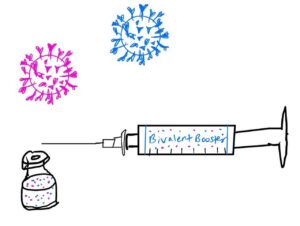The Bivalent COVID-19 Booster?
Why is it important to get the Bivalent COVID-19 Booster?
by Eliane Grace
 It has been over two years since the start of the coronavirus pandemic, yet about 500 people in the United States die from COVID-19 each day. With the start of fall, it is recommended to receive the bivalent COVID-19 booster. Why is getting another vaccination important? What is a bivalent vaccine? Is it safe?
It has been over two years since the start of the coronavirus pandemic, yet about 500 people in the United States die from COVID-19 each day. With the start of fall, it is recommended to receive the bivalent COVID-19 booster. Why is getting another vaccination important? What is a bivalent vaccine? Is it safe?
It is important to get routinely vaccinated because the defense our body builds against the virus that causes COVID-19 does not last forever. Studies currently suggest that our body’s defense against this virus lasts about six months after getting vaccinated. While vaccination does not guarantee you will not catch COVID-19, it significantly lowers the chance of catching and spreading COVID-19. It also makes it less likely that you’ll get really sick even if you do catch it.
Previous COVID-19 vaccines are monovalent. These “monovalent” vaccines protect you against one thing: the original virus that started the COVID-19 pandemic. The new booster vaccine is “bivalent,” which means that it provides protection against two things rather than just one: the original virus that started the COVID-19 pandemic and the new Omicron variants of this virus. Over time, viruses can change their appearance to trick our immune system and infect us. When viruses change their appearance, they are called “variants” and can spread more easily and quickly than the original virus. Getting vaccinated against variants decreases the risk that you will get super sick from a variant and will help decrease its spread.
Now let’s talk about the safety of the bivalent booster. Just like the monovalent vaccine, the bivalent booster contains the mRNA of the original virus that causes COVID-19. “mRNA” is a tiny molecule that these viruses use to make the tools necessary to infect us. These vaccines show our immune system what these special mRNA molecules look like so that we can build the right weapons early on and be ready to destroy the real virus if it ever tries to attack us in the future. However, unlike the monovalent vaccine, the bivalent booster also contains the mRNA of the Omicron variants. The rest of the vaccine is the same as the original monovalent vaccines, which have been shown to be safe with minimal risks and side effects.
Anyone aged five or older who has completed the initial series of COVID-19 monovalent vaccinations (for example, two Pfizer doses or two Moderna doses) can receive the bivalent booster. It is recommended to wait two months after your last COVID-19 vaccine or three months after catching COVID-19 before getting the booster.
Moderna doses) can receive the bivalent booster. It is recommended to wait two months after your last COVID-19 vaccine or three months after catching COVID-19 before getting the booster.
You can receive the bivalent booster for free at CVS, but you need to schedule an appointment first. Visit https://es.cvs.com/immunizations/covid-19-vaccine to schedule your vaccination!
References:
1. Lubell, Jennifer. “Answering Patients’ Questions about the Bivalent COVID-19 Vaccine.” American Medical Association, 15 September 2022, https://www.ama-assn.org/delivering-care/public-health/answering-patients-questions-about-bivalent-covid-19-vaccine.
2. “Coronavirus Disease 2019 (COVID-19).” Centers for Disease Control and Prevention, 11 February 2020, https://www.cdc.gov/coronavirus/2019-ncov/science/science-briefs/vaccine-induced-immunity.html.
3. “Clinical Guidance for COVID-19 Vaccination.” Center for Disease Control and Prevention, 19 October 2022, https://www.cdc.gov/vaccines/covid-19/clinical-considerations/interim-considerations-us.html.
4. Chalkias, Spyros, et al. “A Bivalent Omicron-Containing Booster Vaccine against Covid-19.” The New England Journal of Medicine, vol. 387, no. 14, October 2022, pp. 1279–91. PubMed, https://doi.org/10.1056/NEJMoa2208343.
5. Bendix, Aria and Pettypiece, Shannon. “Covid Will Be a Leading Cause of Death in the U.S. Indefinitely, Whether or Not the Pandemic Is ‘Over.’” NBC News, 19 September 2022, https://www.nbcnews.com/health/health-news/covid-will-leading-cause-death-indefinitely-us-rcna48374.
6. Hui, David S. “Hybrid Immunity and Strategies for COVID-19 Vaccination.” The Lancet Infectious Diseases, September 2022. ScienceDirect, https://doi.org/10.1016/S1473-3099(22)00640-5.
7. Lee, Eunjin, and Ji Eun Oh. “Humoral Immunity against SARS-CoV-2 and the Impact on COVID-19 Pathogenesis.” Molecules and Cells, vol. 44, no. 6, June 2021, pp. 392–400. PubMed Central, https://doi.org/10.14348/molcells.2021.0075.
8. MacMillan, Carrie. “The Omicron Booster: Your Questions Answered.” Yale Medicine, 23 September 2022, https://www.yalemedicine.org/news/omicron-booster-covid-19.
 Eliane Grace is from Penfield, New York. She graduated from Harvard University in 2021 and is currently a second-year medical student at the University of Rochester School of Medicine and Dentistry. She enjoys baking and singing in the University of Rochester’s medical student acappella group “On Call.” She has thoroughly enjoyed being part of the Latino Health Pathway and looks forward to further engagement with the Latino community in Upstate New York.
Eliane Grace is from Penfield, New York. She graduated from Harvard University in 2021 and is currently a second-year medical student at the University of Rochester School of Medicine and Dentistry. She enjoys baking and singing in the University of Rochester’s medical student acappella group “On Call.” She has thoroughly enjoyed being part of the Latino Health Pathway and looks forward to further engagement with the Latino community in Upstate New York.

